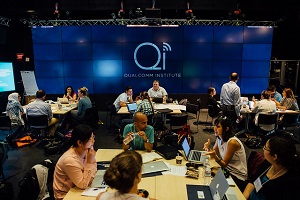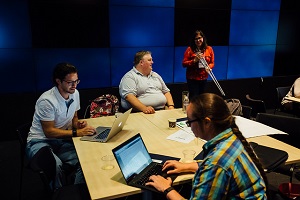Health Data Exploration Institute Equips ‘Cream of the Crop' Participants with Research Skillsets
San Diego, Calif., Aug. 16, 2016 — The Health Data Exploration (HDE) project’s first annual Summer Institute – an opportunity to create a large network of people interested in public health data and teach participants skills needed to become involved in the field – was recently held at the University of California San Diego’s Qualcomm Institute.
The HDE project, a California Institute for Telecommunications and Information Technology (Calit2) project with support from the Robert Wood Johnson Foundation (RWJF), received more than 70 applications for the summer institute. Organizers then trimmed the participants down to less than half of the original starting number.

“We were really dealing with the cream of the crop,” HDE co-investigator Matthew Bietz, said of the 31 participants, who hailed from 28 universities and institutions across the United States. The participants – both doctoral students and early-career researchers among them – learned an array of skills at the rigorous, week-long training, including methods for working with big data, interdisciplinary collaboration, experimental design, data simulation, statistics and human-computer interaction.
The sessions began with a faculty member presenting a seminar focused on a particular area of study, such as genomics, computer science or medicine. Presenters included Kevin Patrick, director of the QI Center for Wireless and Population Health Systems, Bonnie Spring, director of the Center for Behavior and Health at Northwestern University, and Ming-Hsiang Tsou, director of the center for Human Dynamics in the Mobile Age at San Diego State University.
After the presentations, students and faculty worked together in groups on assigned projects for the week. All six of the group project topics were conceived of by the students. They included producing a technologically-enhanced tool for aiding heart-failure patients, supporting dementia patient and caregiver interaction with mobile technology and building a more precise characterization of the food environment experienced in mixed-income neighborhoods.

An interesting coincidence occurred while the summer institute took place: less than a week before the institute began, the “Pokemon Go” app was released and promptly exploded to more than 100 million downloads. This proved to be particularly compelling for the institute’s students and faculty alike, as the app involves users going out into the real world and therefore promotes physical activity – a focus of the HDE project. While Pokemon Go wasn’t an official focus of the summer institute, it was brought up in many of the conversations there. Similarly, the FitBit pedometer was used as a real-world example for many of the discussions involving health technologies at the institute.
Many organizations aided the HDE project in running the summer institute, such as RWJF, the Open Humans data sharing project, the LoseIt! weight-loss application and UNICEF’s Kid Power activity bands, which are pedometers for children that promote childhood physical activity.
Bietz says the results of this first summer institute were very positive, though there were challenges as well – one of the main obstacles being that the institute needed to be long enough for students involved to work in-depth on their projects, but not be too long so as to overwhelm them. The majority of the institute’s sessions lasted from 8:30 a.m. to 5 p.m., the equivalent of a full-time work schedule.
HDE is currently working on funding to host next year’s summer institute.
“There’s always a learning curve, but I’m happy with how it went for the first year,” Bietz added.
Related Links
Health Data Exploration Summer Institute
Media Contacts
Tiffany Fox
(858) 246-0353
tfox@ucsd.edu
